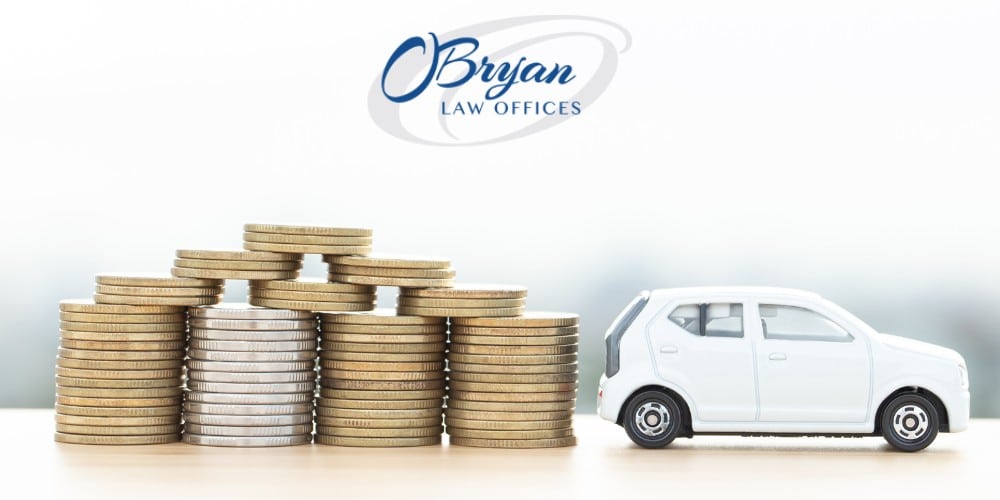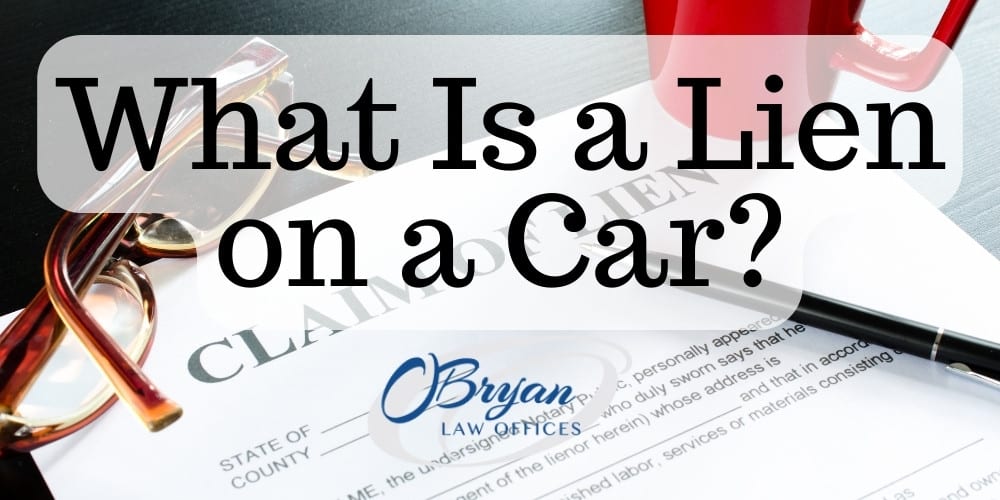Buying and selling motor vehicles can be very exciting, but also very complicated. Even the smallest details can affect the processes of buying and selling vehicles. If you’re looking to buy or sell a car with a lien, it’s important to understand how that car lien may affect you. In this blog post, the attorneys at O’Bryan Law Offices answer common questions, such as, “What is a lien on a car?” We also explain how the lien status can impact the transaction.
At O’Bryan Law Offices, we make it our goal to educate Kentucky citizens about bankruptcy, finances, and everything in between. It’s important to understand all the nuances of certain processes, but it can be difficult to understand everything on your own. In certain cases, it makes much more sense to work with a seasoned attorney in order to protect your finances. If you’re faced with tough financial decisions, contact the Louisville bankruptcy lawyers at O’Bryan Law Offices. We can help you navigate your way through overwhelming debt and give you advice on how to achieve better financial footing. To schedule your free consultation with us, please call our office at 502-339-0222 today.
What Is a Lien?
First, let’s cover what exactly a lien is. Liens are legal rights that creditors have against certain assets that are often used as collateral, such as homes or vehicles. Liens serve to ensure that certain obligations are met by debtors. One example includes repaying a car loan. If the debtor fails to satisfy the obligation, such as missing auto loan payments, the lien holder or creditor can take back the asset on which there is a lien. In other words, the lien holder of your car lien can repossess the vehicle if you default on your car loan.
Types of Liens on Cars
There are several different car lien types that could affect the purchasing or selling of a vehicle. The most common type of car lien is placed when someone decides to finance the vehicle, which means they take out an auto loan that they will pay off over time. Other less common types of liens include child support liens, operation of law liens, and mechanic’s liens.
Is a Lien the Same as a Loan?
Technically no, although liens and loans often go hand in hand. The lien itself gives a creditor or auto loan lender a legal claim to the vehicle in the event that the debtor fails to pay the loan. Basically, placing a lien on the vehicle allows the borrower to secure the loan in order to pay for the vehicle.
What Is a Lienholder?
A lien holder, also known as a lienor, is the person or entity that holds your car loan until you fully pay it off. Different parties can be considered the legal owner of a car lien, and they can also require certain actions from the borrower, such as buying certain types of insurance coverages.
Who Can Be a Lienholder on a Car?
Different parties can be considered lien holders on vehicles. Any person or party who has a financial interest in the vehicle can be considered a lien holder. Examples of those who can be considered lien holders include private parties, banks, credit unions, and other financial institutions. In other words, a private party could hold the car title, or a bank may hold the lien title.
A friend or family member can even be the lien holder for your vehicle. Maybe they had the car before you or they purchased it on your behalf, and you’re making payments to them for the car. This can be the case for either a used car or a new car. In order for the lien holder to transfer ownership of a car with a lien to you, you will need to pay off your outstanding balance.
Can Lienholders Require You to Buy Specific Insurance?
Yes. Lien holders have the legal right to require you to purchase certain types of insurance coverage for the vehicle. If you purchase a car with a lien, the lien holder may require you to also purchase comprehensive coverage or collision coverage. This protects the lien holder in the event that the vehicle suffers property damage or is stolen.
They may even be able to determine your monthly payments, your deductible, how much coverage you need, and they may even be listed on your insurance policy. If you need to add your lien holder to your policy, you should take the following steps.
- Gather your lien holder’s information, including their phone numbers, account numbers, mailing address, and other relevant information.
- Ask your insurance company to add the lien holder to your policy.
- Inform your insurance company of the insurance requirements that your lien holder has specified for you. You may need to adjust your insurance policy in order to accomplish this.
- Ask your insurance company to notify the lien holder once the above steps are completed. Be sure to check in with your lien holder to verify that all paperwork has been completed and submitted.
What Is a Lien on a Car?

As soon as you decide to finance a vehicle, a lien is placed on that vehicle. This allows the lender of the auto loan to hold the car’s title. While they hold the car title, they are considered the legal owner of the vehicle. Until the car loan is fully paid off, the lien protects the lender in the event that the borrower defaults on their loan. When a borrower defaults, the lender can then repossess the vehicle.
Who Holds a Lien on a Car?
Whoever your lender was at the time of the vehicle purchase is who your lien holder will be. As we mentioned previously, this could be a private seller, a bank, a credit union, an escrow service, or another type of financial institution. If you’re unsure of who the lender is, there is an easy way to check for this information. If you do have the car title, you can find the lien holder’s information on that document. However, most states allow lien holders to keep the title of the car until you completely pay off your loan.
If you don’t have the car title, you can contact your local DMV or the Secretary of State. Give them your vehicle identification number (VIN), the model, and the make of the car. They will then tell you who the lender or owner of the vehicle is.
How to Find Lien Information on a Car
In some cases, you may need information about your lien other than who the lien holder is. You can (and should) also check a vehicle’s lien history and information before buying a car. This is a smart move, as it can provide you with important information about a private seller before you start shelling out your hard-earned money. Below, we outline a few ways in which you can check the lien status of a vehicle as a new buyer.
- Check with your state’s DMV. You may be able to search for liens online by providing the VIN number, which should be located in one of the following places.
- On the driver’s side door where it closes
- Inside the hood of the car
- On the lower left side of the car’s windshield
- On the car’s engine
- If you have the title of the vehicle, you should be able to check the title for lien information.
- You can also ask for what is called a vehicle history report. This report includes information such as the lien history, information about previous owners, odometer readings, and even previous damage to the vehicle. This is all very important information to know before buying a used car.
Can I Sell a Car with an Auto Lien?
Yes. However, selling or buying a car with a lien can be more complicated than doing the same with a car that doesn’t have a lien. In general, a lien prevents you from selling a vehicle until the loan is paid in full. There are a few ways around this.
First, you could contact your lien holder if you want to sell your vehicle. We recommend working closely with the lien holder if you plan to sell the car to a private party. They can inform you of exactly how much you owe on the vehicle, and therefore how much you need to make in the sale.
Another option is trading in the vehicle at a car dealership. This is often a more attractive option, as the dealership may offer to pay the remaining balance as part of the trade-in deal. This also makes the process of selling a car easier, as the dealership will handle the transfer of the title. Keep in mind that this option generally results in the seller receiving less money for the vehicle.
Buying a Car with a Lien
You can also buy a car with a lien on it. However, we strongly recommend that you do extensive research on the vehicle before doing so. Sellers may be more lenient on the price of the vehicle if it has a lien on it, which makes this an attractive option. Thorough research is essential, so we recommend getting information on the lien and the vehicle from your local DMV. The three main options for buying a car with a lien include the following.
- The seller pays off the loan fully by taking out a personal loan. This can make the title transfer process proceed more smoothly.
- You could pay off the loan directly. This will usually require coordination between the lien holder and the seller.
- You could also take over the lien yourself. However, not all lenders allow the transfer of auto loans. They’ll also likely run a credit check if they do allow loan transfers.
How Can a Lien Affect Your Car Purchase?
Let’s say that you purchase a car without first confirming the lien release. If you buy a car when the owner still owes money on it, you won’t get the title of the car until the remaining balance is paid to the lien holder. We strongly recommend securing proof that the lien has been paid, such as a lien release document. If the previous owner hasn’t settled the lien, you may be left paying the remaining balance even though you don’t have the title of the vehicle.
Contact O’Bryan Law Offices Today
At O’Bryan Law Offices, we understand how difficult it can be to navigate complicated processes on your own, especially if you’re a first time buyer or seller. Car liens can complicate these processes even further, so it’s important to do your research before making any concrete decisions. Our bankruptcy attorneys have extensive experience helping our clients avoid repossession of their vehicles and foreclosure on their homes. If you’ve run into financial trouble in Kentucky or Southern Indiana, we’re here for you. To schedule a free consultation with us, please call our office at 502-339-0222 today.


